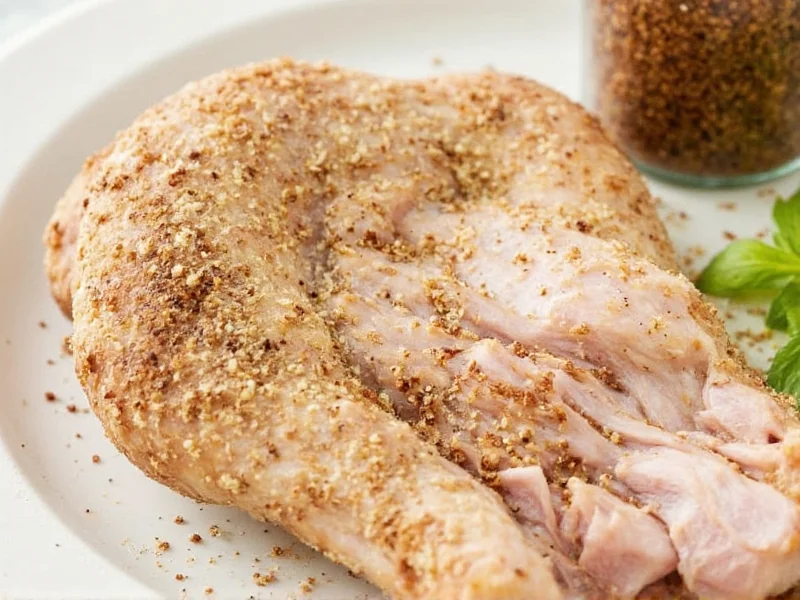Creating your own poultry seasoning blend unlocks richer flavors than store-bought versions while giving you complete control over ingredients. This foundational spice mix has been a kitchen staple for generations, particularly during holiday cooking seasons. Understanding the balance of herbs helps you customize flavors to match your culinary preferences and dietary needs.
Why Make Your Own Poultry Seasoning?
Commercial blends often contain fillers or inconsistent herb ratios that dilute authentic flavor. When you prepare homemade poultry seasoning from scratch, you ensure freshness, avoid unnecessary additives, and can adjust proportions to suit specific recipes. The difference becomes especially noticeable when seasoning roast turkey or preparing traditional Thanksgiving stuffing.
Essential Poultry Seasoning Recipe
This tried-and-true blend delivers the perfect balance of earthy, aromatic flavors that complement poultry without overpowering it.
Basic Ingredients
- 4 tablespoons dried rubbed sage (the foundation flavor)
- 2 tablespoons dried thyme (adds subtle floral notes)
- 2 tablespoons dried marjoram (provides sweet complexity)
- 1 tablespoon dried rosemary (contributes pine-like aroma)
- 1 tablespoon dried parsley (adds freshness)
- 1 teaspoon freshly ground black pepper (enhances other flavors)
- 1 teaspoon dried rubbed sage (reinforces the primary note)
Preparation Instructions
- Measure all dried herbs using standard measuring spoons
- Combine ingredients in a small mixing bowl
- Whisk thoroughly for 30 seconds to ensure even distribution
- Transfer to an airtight container
- Store in a cool, dark place for optimal freshness
| Yield | Prep Time | Storage | Shelf Life |
|---|---|---|---|
| ¾ cup blend | 5 minutes | Airtight container | 6 months |
Understanding Each Ingredient's Role
Successful poultry seasoning blend for turkey and chicken depends on understanding how each herb contributes to the final flavor profile:
Sage
The dominant flavor in traditional poultry seasoning, sage provides an earthy, slightly peppery base that complements poultry's natural richness. Rubbed sage releases more flavor than whole leaves.
Thyme and Marjoram
These complementary herbs add complexity—thyme brings subtle lemon notes while marjoram contributes sweeter, floral undertones that balance sage's intensity.
Rosemary
Use sparingly as its pine-like flavor can dominate. It adds depth and works particularly well with roasted poultry preparations.
Using Your Poultry Seasoning Effectively
Proper application makes all the difference in your best homemade poultry seasoning recipe:
For Whole Roasted Birds
- Mix 2 tablespoons seasoning with 2 tablespoons softened butter
- Gently loosen skin and rub mixture directly on meat
- Season cavity with 1 tablespoon blend
- Apply additional seasoning to skin before roasting
For Stuffing and Dressing
Incorporate 3-4 tablespoons per loaf of stuffing for authentic holiday flavor. Add during the final mixing stage to preserve volatile oils.
Storage Guidelines for Maximum Freshness
Dried herbs lose potency over time. Follow these tips for long-lasting homemade poultry seasoning:
- Store in glass jar with tight-sealing lid
- Keep away from heat sources and direct sunlight
- Label container with preparation date
- Refresh blend every 6 months for optimal flavor
- Never store above the stove where heat degrades quality
Customizing Your Blend
Adapt this versatile poultry seasoning recipe for different dishes with these variations:
Mediterranean Twist
Add ½ teaspoon dried oregano and ¼ teaspoon lemon zest for lighter poultry dishes.
Smoked Version
Substitute 1 tablespoon regular paprika with smoked paprika for grilled chicken applications.
Low-Sodium Alternative
Omit added salt (if your commercial blend contains it) and increase herb quantities by 25% to compensate for flavor.
Troubleshooting Common Issues
Address these frequent challenges with your DIY poultry seasoning preparation:
Flavor Too Mild
Double the sage quantity or add ¼ teaspoon celery seed for enhanced depth without overpowering.
Overpowering Sage
Balance with additional thyme and marjoram at 1:1 ratio to reduce sage dominance.
Inconsistent Flavor
Always whisk thoroughly and store in single container rather than mixing per use for uniform results.
Seasoning Measurements Guide
Use this reference for perfect poultry seasoning proportions based on bird weight:
| Bird Weight | Seasoning Amount | Butter Mixture |
|---|---|---|
| 8-12 lbs (turkey) | 3 tablespoons | 3 tbsp seasoning + 3 tbsp butter |
| 3-5 lbs (chicken) | 1½ tablespoons | 1½ tbsp seasoning + 1½ tbsp butter |
| Per pound stuffing | 1 tablespoon | N/A |
Conclusion
Mastering this simple poultry seasoning recipe from scratch transforms ordinary poultry dishes into memorable meals. The ability to adjust flavors to your preference while avoiding preservatives makes homemade seasoning superior to commercial alternatives. Keep a batch in your spice cabinet for whenever you need authentic flavor for roast chicken, turkey, or traditional holiday stuffing.











 浙公网安备
33010002000092号
浙公网安备
33010002000092号 浙B2-20120091-4
浙B2-20120091-4